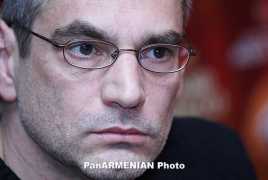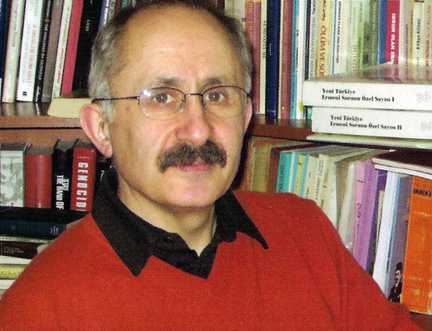 EpressAm — A two-day symposium entitled “The Normalization Process between Turkey and Armenia: Prospects for Revitalization” took place in Istanbul last week with the participation of about 30 well-known academics and experts from Turkey and Armenia, as well as from other countries.
EpressAm — A two-day symposium entitled “The Normalization Process between Turkey and Armenia: Prospects for Revitalization” took place in Istanbul last week with the participation of about 30 well-known academics and experts from Turkey and Armenia, as well as from other countries.
The symposium aimed to explore the dynamics of the Armenia-Turkey rapprochement process in 2008–2009, the factors that led to the current stalemate, as well as the prospects for the revitalization of the normalization process. Participants were expected to examine the evolution of the rapprochement by focusing on its intergovernmental as well as civil society dimensions, as well as to analyze the current state of the normalization process by not only exploring the positions of the parties, but also situating the process into the relevant regional and international context.
The symposium also happened to coincide with the day in 1923 when Turkey declared itself a republic (Oct. 29).
Participating in the symposium from Armenia were military and political analyst Richard Giragosian (pictured); Caucasus Institute Director Alexander Iskandaryan, Human Rights and Conflicts Research Institute NGO President Armen Melkonyan and head of the Political Studies Department at the Caucasus Institute Sergey Minasyan.
Richard Giragosian shared his impressions of the symposium and his prospects for Armenian-Turkish relations with editor of the Istanbul-based IMC TV Aris Nalci, particularly noting that the delegation from Armenia was somewhat frustrated and disappointed after the symposium.
Giragosian said though the conference was organized by two leading universities in Ankara with the support of Turkey’s Ministry of Foreign Affairs, and aimed to find new ways of revitalizing the normalization process, but it seems clear that this conference reaffirmed two realities: the first, Armenian-Turkish normalization is no longer a priority for Turkey, and second, Turkey is once again attempting to “repackage” a precondition over Nagorno-Karabakh with Armenian-Turkish diplomacy.
“Despite the fact that both the US and Russia, as well as the EU have made it clear there is no reference to Karabakh within the Protocols. And to attempt at this late stage to re-link the issues is unhelpful at best and insincere at worst. So what we see is Turkey seems rather insincere and in danger of being perceived as an unreliable and unready interlocutor for Armenia,” he said, adding that it’s unfortunate because “we have a window of opportunity that is now closing.”
The analyst pointed out that all expectations and the burden are on Turkey, as “Armenia has done everything it can and more.”
On the matter of normalizing Armenia-Turkey relations, Giragosian highlighted Azerbaijan’s role, saying that though Azerbaijan has no place in the dialogue between the two states, it does, however, have great power over Turkey. In his opinion, this is a problem Turkey has to deal with, just as the Armenian Genocide is a problem Turkey has to deal with.
“The Azerbaijan issue has become a domestic Turkish political issue,” he added.
Speaking about the effectiveness of the discussions held in Istanbul, Giragosian said that such meetings are very important (“the dialogue of normalization needs to continue”) as they sustain the momentum of “Track 2 Diplomacy” between Armenia and Turkey, “to prepare the groundwork for when the states are ready to recommit.”
“What we’re also doing is correcting a mistake from the Protocols. The mistake was neither Turkey nor Armenia did enough to prepare public opinion for normalization,” he said.
Asked by Nalci what Armenia’s next steps might be, Giragosian said:
“We can continue to pressure the Turkish side and to keep the Armenian side willing and ready to move forward. But at the same time what we can do is what we’re doing — Track 2 diplomacy in terms of civil society engagement, to actually sustain this momentum… Just the fact that we’re coming and going to each other’s countries, just the fact that the Genocide issue is no longer taboo means that we need to recognize and build on the progress we have made to date,” he explained.
If Turkey doesn’t respond to Armenia’s move, if there is no rapprochement, what might Armenia’s policy be? asked Nalci.
“Well, unfortunately, what concerns me from a civil society point of view is that Turkey seems to fail to recognize the fact that patience on the Armenian side is not without limit. And a policy of preconditions is bold by the Armenian side but without reciprocal measures from the Turkish side it’s a dangerous political policy that may change. And the real pressure Turkey faces is 2015, the 100th anniversary of the Armenian Genocide… I’m just worried that if the stars don’t align again and normalization doesn’t return to Track 1 state level, there is a bigger danger that next time we try this it will be that much harder,” Giragosian concluded.
Article source:
via ArmeniaDiaspora.com – News from Armenia, Events in Armenia, Travel and Entertainment | Armenia Delegation Disappointed with Istanbul Symposium to Revitalize Armenia-Turkey Rapprochement: Giragosian.






 :: Thursday 27 October 2011
:: Thursday 27 October 2011
